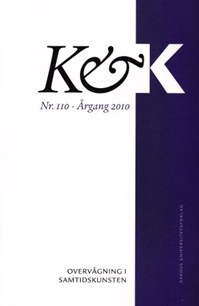PÅ TYSKE PRÆMISSER, MEN MED GLOBALT PERSPEKTIV - OVERVÅGNING I NYERE TYSK LITTERATUR
DOI:
https://doi.org/10.7146/kok.v38i110.15776Nøgleord:
overvågning, nyere tysk litteratur, TysklandResumé
SURVEILLANCE AND SPYING IN NEW GERMAN LITERATURE
Surveillance is a remarkably prominent issue in the actual political debate in Germany. It is undoubtedly connected with past experiences. Both the Nazi-regime and the communist dictatorship in East Germany from 1945‑1989 developed sophisticated systems for controlling citizens, thus the modern sensibility in Germany toward surveillance is explicitly a reaction against those regimes. “Never more a GDR” is a slogan that is often seen in newspapers and Internet sites.
It is surprising however that this topic has had a relatively insignificant position in new German literature since the fall of the wall. In the late eighties and early nineties surveillance and spying was treated with humour and forbearance: there was something comical about the spy-game; the spies were often poor guys and it was the general conviction that the system would disappear with the reunion.
All this has changed after September 11th and the fight against terrorism which it activated. The opening up of the Stasi archives has also drawn new attention and sensibility to the issue. Two examples of this new tone are presented: Susanne Schädlich writes about her uncle spying on her father Hans-Joachim Schädlich – also after his emigration to Western Germany. It is a story about a family fission and of how to continue one’s life with the treachery of a once beloved person. Juli Zeh uses her education and training as a jurist to scrutinize the total system of surveillance in a society still claiming to be democratic. She does so in a collection of essays (with Ilija Trojanow) and in her best seller novels, latest Corpus delicti with the Kafka-sounding subtitle “a process”. Juli Zeh is the most prominent example of the tendency in new German literature to take up the tradition from the GDR-literature with its ethical obligation and fight against the totalitarian state. She is an example of the tendency to activate this special German tradition under new political circumstances – and new global perspectives.
Downloads
Publiceret
Citation/Eksport
Nummer
Sektion
Licens
Tidsskriftet følger dansk ophavsret.





